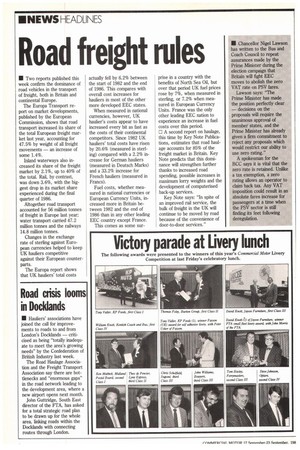Road freight rules
Page 8

If you've noticed an error in this article please click here to report it so we can fix it.
• Two reports published this week confirm the dominance of road vehicles in the transport of freight, both in Britain and continental Europe.
The Europa Transport report on market developments, published by the European Commission, shows that road transport increased its share of the total European freight market last year, accounting for 47.5% by weight of all freight movements — an increase of some 1.4%.
Inland waterways also increased its share of the freight market by 2.1%, up to 40% of the total. Rail, by contrast, was down 3.6%, with the biggest drop in its market share experienced during the final quarter of 1986.
Altogether road transport accounted for 56 million tonnes of freight in Europe last year; water transport carried 47.2 million tonnes and the railways 14.8 million tonnes.
Changes in the exchange rate of sterling against European currencies helped to keep UK hauliers competitive against their European counterparts.
The Europa report shows that UK hauliers' total costs actually fell by 6.2% between the start of 1982 and the end of 1986. This compares with overall cost increases for hauliers in most of the other more developed EEC states.
When measured in national currencies, however, UK haulier's costs appear to have increased every bit as fast as the costs of their continental competitors. Since 1982 UK hauliers' total costs have risen by 20.6% (measured in sterling) compared with a 2.2% increase for German hauliers (measured in Deutsch Marks) and a 33.2% increase for French hauliers (measured in Francs).
Fuel costs, whether measured in national currencies or European Currency Units, increased more in Britain between 1982 and the end of 1986 than in any other leading EEC country except France.
This comes as some sur prise in a country with the benefits of North Sea Oil, but over that period UK fuel prices rose by 7%, when measured in sterling, or 7.2% when measured in European Currency Units. France was the only other leading EEC nation to experience an increase in fuel costs over this period.
El A second report on haulage, this time by Key Note Publications, estimates that road haulage accounts for 85% of the freight market in Britain. Key Note predicts that this dominance will strengthen further thanks to increased road spending, possible increases in maximum lorry weights and the development of computerised back-up services.
Key Note says: "In spite of an improved rail service, the bulk of freight in the UK will continue to be moved by road because of the convenience of door-to-door services."




































































































